University Diabetes Study: Approaches to Nursing Practice Report
VerifiedAdded on 2020/03/04
|14
|3420
|57
Report
AI Summary
This report details a prospective, quantitative study investigating the relationship between lifestyle factors, specifically physical activity and dietary intake, and the prevalence of diabetes in a New Zealand population aged 35-60 years. The study aims to understand the impact of lifestyle on diabetes onset and to recommend strategies for mitigating the condition. The methodology includes surveys using the Global Physical Activity Questionnaire and Eating Habits Questionnaire, with a sample of 100 diabetic respondents. The study also explores the role of Community Health Workers (CHW) in addressing diabetes management within the Māori and Pacific Islander communities, highlighting the importance of cultural sensitivity and community-based interventions. Ethical considerations, including data confidentiality and funding from the Ministry of Health, are also addressed. The report emphasizes the significance of the study in addressing a major health concern, potentially leading to improved healthcare strategies and interventions.
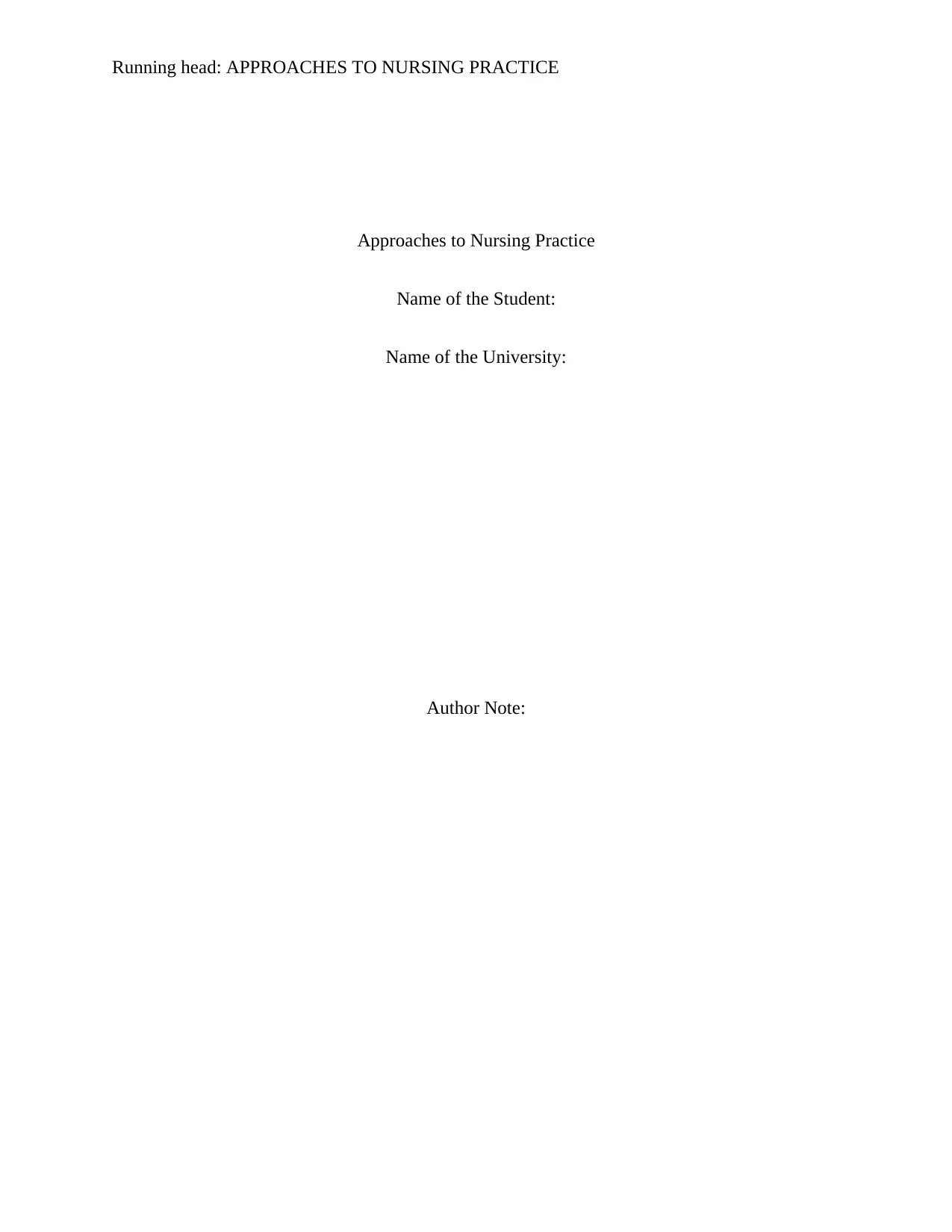
Running head: APPROACHES TO NURSING PRACTICE
Approaches to Nursing Practice
Name of the Student:
Name of the University:
Author Note:
Approaches to Nursing Practice
Name of the Student:
Name of the University:
Author Note:
Paraphrase This Document
Need a fresh take? Get an instant paraphrase of this document with our AI Paraphraser
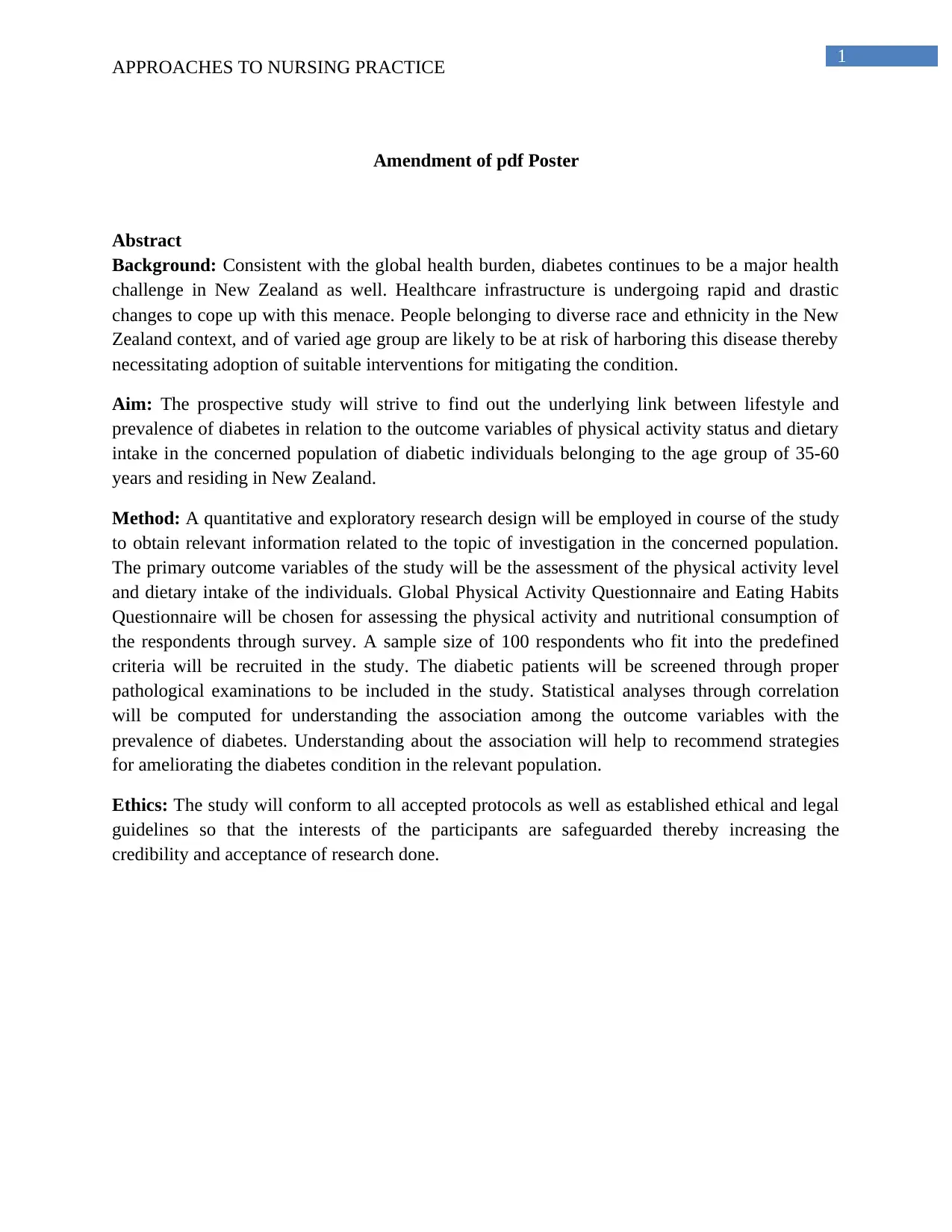
1
APPROACHES TO NURSING PRACTICE
Amendment of pdf Poster
Abstract
Background: Consistent with the global health burden, diabetes continues to be a major health
challenge in New Zealand as well. Healthcare infrastructure is undergoing rapid and drastic
changes to cope up with this menace. People belonging to diverse race and ethnicity in the New
Zealand context, and of varied age group are likely to be at risk of harboring this disease thereby
necessitating adoption of suitable interventions for mitigating the condition.
Aim: The prospective study will strive to find out the underlying link between lifestyle and
prevalence of diabetes in relation to the outcome variables of physical activity status and dietary
intake in the concerned population of diabetic individuals belonging to the age group of 35-60
years and residing in New Zealand.
Method: A quantitative and exploratory research design will be employed in course of the study
to obtain relevant information related to the topic of investigation in the concerned population.
The primary outcome variables of the study will be the assessment of the physical activity level
and dietary intake of the individuals. Global Physical Activity Questionnaire and Eating Habits
Questionnaire will be chosen for assessing the physical activity and nutritional consumption of
the respondents through survey. A sample size of 100 respondents who fit into the predefined
criteria will be recruited in the study. The diabetic patients will be screened through proper
pathological examinations to be included in the study. Statistical analyses through correlation
will be computed for understanding the association among the outcome variables with the
prevalence of diabetes. Understanding about the association will help to recommend strategies
for ameliorating the diabetes condition in the relevant population.
Ethics: The study will conform to all accepted protocols as well as established ethical and legal
guidelines so that the interests of the participants are safeguarded thereby increasing the
credibility and acceptance of research done.
APPROACHES TO NURSING PRACTICE
Amendment of pdf Poster
Abstract
Background: Consistent with the global health burden, diabetes continues to be a major health
challenge in New Zealand as well. Healthcare infrastructure is undergoing rapid and drastic
changes to cope up with this menace. People belonging to diverse race and ethnicity in the New
Zealand context, and of varied age group are likely to be at risk of harboring this disease thereby
necessitating adoption of suitable interventions for mitigating the condition.
Aim: The prospective study will strive to find out the underlying link between lifestyle and
prevalence of diabetes in relation to the outcome variables of physical activity status and dietary
intake in the concerned population of diabetic individuals belonging to the age group of 35-60
years and residing in New Zealand.
Method: A quantitative and exploratory research design will be employed in course of the study
to obtain relevant information related to the topic of investigation in the concerned population.
The primary outcome variables of the study will be the assessment of the physical activity level
and dietary intake of the individuals. Global Physical Activity Questionnaire and Eating Habits
Questionnaire will be chosen for assessing the physical activity and nutritional consumption of
the respondents through survey. A sample size of 100 respondents who fit into the predefined
criteria will be recruited in the study. The diabetic patients will be screened through proper
pathological examinations to be included in the study. Statistical analyses through correlation
will be computed for understanding the association among the outcome variables with the
prevalence of diabetes. Understanding about the association will help to recommend strategies
for ameliorating the diabetes condition in the relevant population.
Ethics: The study will conform to all accepted protocols as well as established ethical and legal
guidelines so that the interests of the participants are safeguarded thereby increasing the
credibility and acceptance of research done.
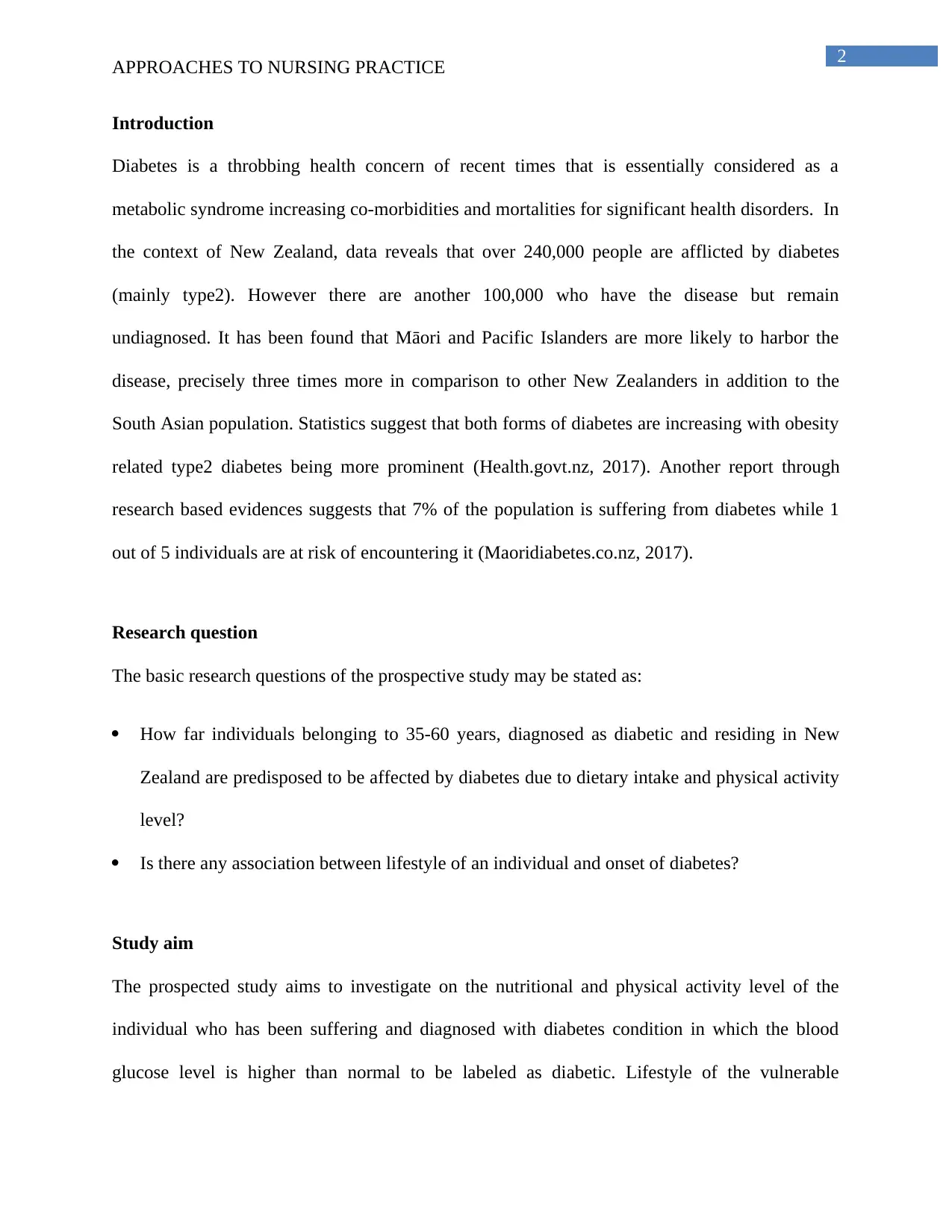
2
APPROACHES TO NURSING PRACTICE
Introduction
Diabetes is a throbbing health concern of recent times that is essentially considered as a
metabolic syndrome increasing co-morbidities and mortalities for significant health disorders. In
the context of New Zealand, data reveals that over 240,000 people are afflicted by diabetes
(mainly type2). However there are another 100,000 who have the disease but remain
undiagnosed. It has been found that Māori and Pacific Islanders are more likely to harbor the
disease, precisely three times more in comparison to other New Zealanders in addition to the
South Asian population. Statistics suggest that both forms of diabetes are increasing with obesity
related type2 diabetes being more prominent (Health.govt.nz, 2017). Another report through
research based evidences suggests that 7% of the population is suffering from diabetes while 1
out of 5 individuals are at risk of encountering it (Maoridiabetes.co.nz, 2017).
Research question
The basic research questions of the prospective study may be stated as:
How far individuals belonging to 35-60 years, diagnosed as diabetic and residing in New
Zealand are predisposed to be affected by diabetes due to dietary intake and physical activity
level?
Is there any association between lifestyle of an individual and onset of diabetes?
Study aim
The prospected study aims to investigate on the nutritional and physical activity level of the
individual who has been suffering and diagnosed with diabetes condition in which the blood
glucose level is higher than normal to be labeled as diabetic. Lifestyle of the vulnerable
APPROACHES TO NURSING PRACTICE
Introduction
Diabetes is a throbbing health concern of recent times that is essentially considered as a
metabolic syndrome increasing co-morbidities and mortalities for significant health disorders. In
the context of New Zealand, data reveals that over 240,000 people are afflicted by diabetes
(mainly type2). However there are another 100,000 who have the disease but remain
undiagnosed. It has been found that Māori and Pacific Islanders are more likely to harbor the
disease, precisely three times more in comparison to other New Zealanders in addition to the
South Asian population. Statistics suggest that both forms of diabetes are increasing with obesity
related type2 diabetes being more prominent (Health.govt.nz, 2017). Another report through
research based evidences suggests that 7% of the population is suffering from diabetes while 1
out of 5 individuals are at risk of encountering it (Maoridiabetes.co.nz, 2017).
Research question
The basic research questions of the prospective study may be stated as:
How far individuals belonging to 35-60 years, diagnosed as diabetic and residing in New
Zealand are predisposed to be affected by diabetes due to dietary intake and physical activity
level?
Is there any association between lifestyle of an individual and onset of diabetes?
Study aim
The prospected study aims to investigate on the nutritional and physical activity level of the
individual who has been suffering and diagnosed with diabetes condition in which the blood
glucose level is higher than normal to be labeled as diabetic. Lifestyle of the vulnerable
⊘ This is a preview!⊘
Do you want full access?
Subscribe today to unlock all pages.

Trusted by 1+ million students worldwide
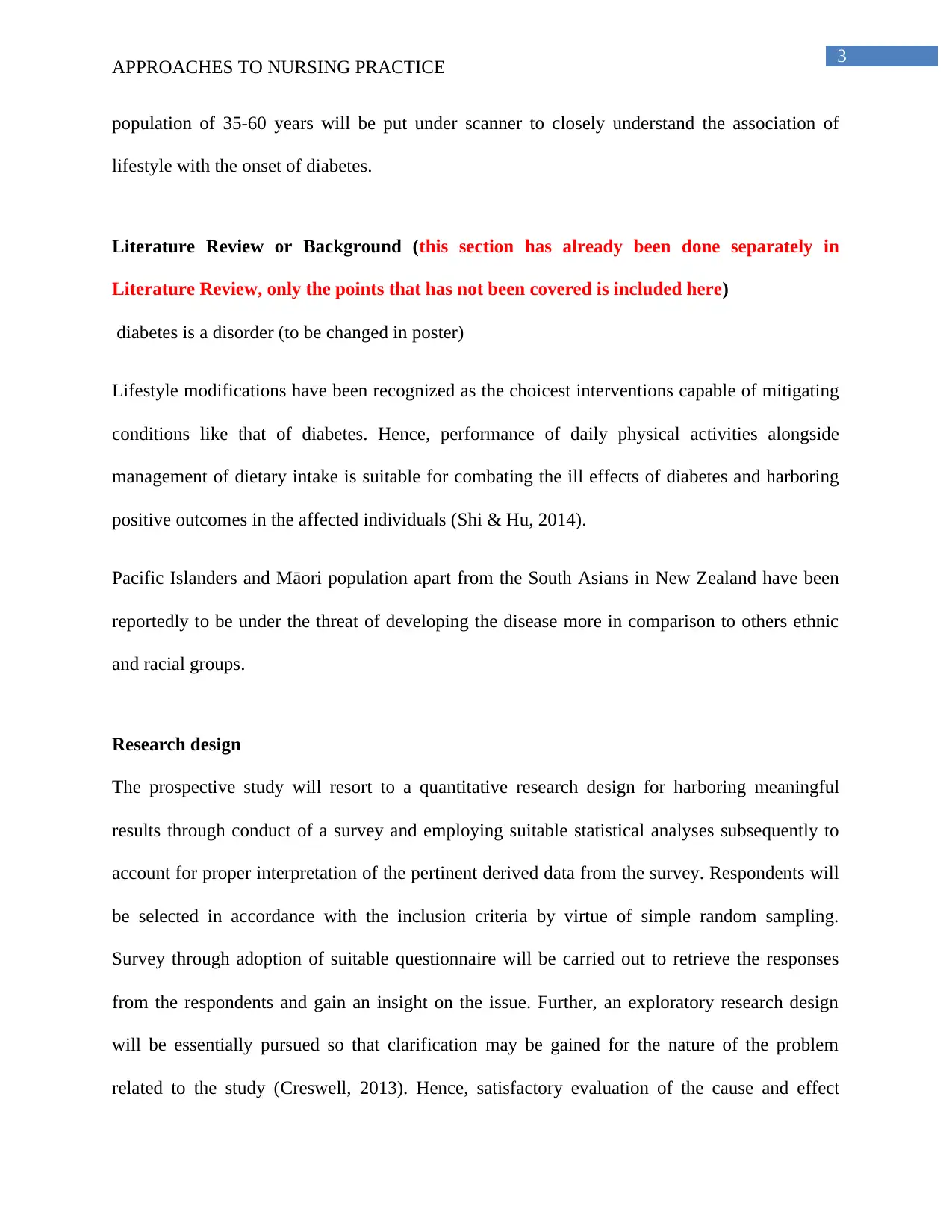
3
APPROACHES TO NURSING PRACTICE
population of 35-60 years will be put under scanner to closely understand the association of
lifestyle with the onset of diabetes.
Literature Review or Background (this section has already been done separately in
Literature Review, only the points that has not been covered is included here)
diabetes is a disorder (to be changed in poster)
Lifestyle modifications have been recognized as the choicest interventions capable of mitigating
conditions like that of diabetes. Hence, performance of daily physical activities alongside
management of dietary intake is suitable for combating the ill effects of diabetes and harboring
positive outcomes in the affected individuals (Shi & Hu, 2014).
Pacific Islanders and Māori population apart from the South Asians in New Zealand have been
reportedly to be under the threat of developing the disease more in comparison to others ethnic
and racial groups.
Research design
The prospective study will resort to a quantitative research design for harboring meaningful
results through conduct of a survey and employing suitable statistical analyses subsequently to
account for proper interpretation of the pertinent derived data from the survey. Respondents will
be selected in accordance with the inclusion criteria by virtue of simple random sampling.
Survey through adoption of suitable questionnaire will be carried out to retrieve the responses
from the respondents and gain an insight on the issue. Further, an exploratory research design
will be essentially pursued so that clarification may be gained for the nature of the problem
related to the study (Creswell, 2013). Hence, satisfactory evaluation of the cause and effect
APPROACHES TO NURSING PRACTICE
population of 35-60 years will be put under scanner to closely understand the association of
lifestyle with the onset of diabetes.
Literature Review or Background (this section has already been done separately in
Literature Review, only the points that has not been covered is included here)
diabetes is a disorder (to be changed in poster)
Lifestyle modifications have been recognized as the choicest interventions capable of mitigating
conditions like that of diabetes. Hence, performance of daily physical activities alongside
management of dietary intake is suitable for combating the ill effects of diabetes and harboring
positive outcomes in the affected individuals (Shi & Hu, 2014).
Pacific Islanders and Māori population apart from the South Asians in New Zealand have been
reportedly to be under the threat of developing the disease more in comparison to others ethnic
and racial groups.
Research design
The prospective study will resort to a quantitative research design for harboring meaningful
results through conduct of a survey and employing suitable statistical analyses subsequently to
account for proper interpretation of the pertinent derived data from the survey. Respondents will
be selected in accordance with the inclusion criteria by virtue of simple random sampling.
Survey through adoption of suitable questionnaire will be carried out to retrieve the responses
from the respondents and gain an insight on the issue. Further, an exploratory research design
will be essentially pursued so that clarification may be gained for the nature of the problem
related to the study (Creswell, 2013). Hence, satisfactory evaluation of the cause and effect
Paraphrase This Document
Need a fresh take? Get an instant paraphrase of this document with our AI Paraphraser
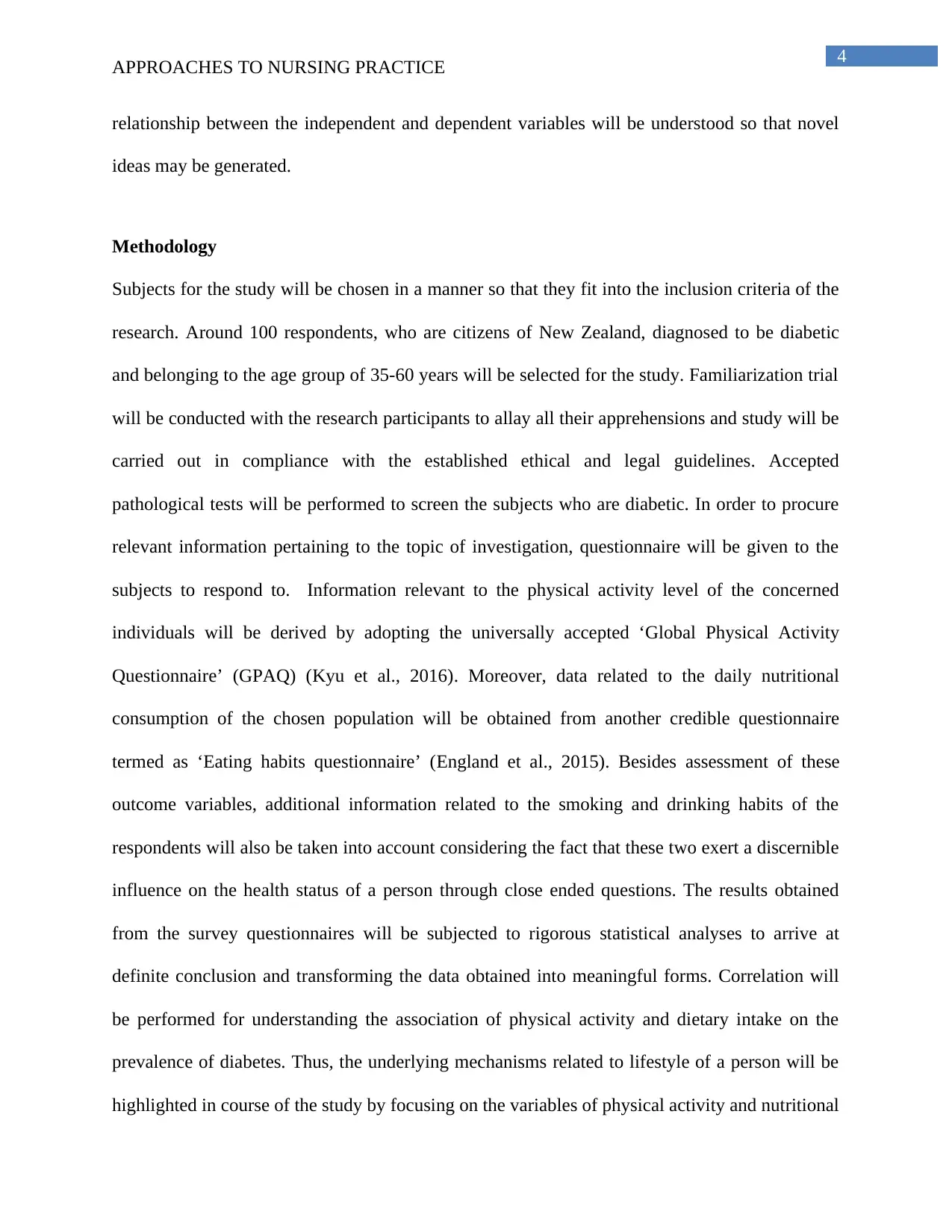
4
APPROACHES TO NURSING PRACTICE
relationship between the independent and dependent variables will be understood so that novel
ideas may be generated.
Methodology
Subjects for the study will be chosen in a manner so that they fit into the inclusion criteria of the
research. Around 100 respondents, who are citizens of New Zealand, diagnosed to be diabetic
and belonging to the age group of 35-60 years will be selected for the study. Familiarization trial
will be conducted with the research participants to allay all their apprehensions and study will be
carried out in compliance with the established ethical and legal guidelines. Accepted
pathological tests will be performed to screen the subjects who are diabetic. In order to procure
relevant information pertaining to the topic of investigation, questionnaire will be given to the
subjects to respond to. Information relevant to the physical activity level of the concerned
individuals will be derived by adopting the universally accepted ‘Global Physical Activity
Questionnaire’ (GPAQ) (Kyu et al., 2016). Moreover, data related to the daily nutritional
consumption of the chosen population will be obtained from another credible questionnaire
termed as ‘Eating habits questionnaire’ (England et al., 2015). Besides assessment of these
outcome variables, additional information related to the smoking and drinking habits of the
respondents will also be taken into account considering the fact that these two exert a discernible
influence on the health status of a person through close ended questions. The results obtained
from the survey questionnaires will be subjected to rigorous statistical analyses to arrive at
definite conclusion and transforming the data obtained into meaningful forms. Correlation will
be performed for understanding the association of physical activity and dietary intake on the
prevalence of diabetes. Thus, the underlying mechanisms related to lifestyle of a person will be
highlighted in course of the study by focusing on the variables of physical activity and nutritional
APPROACHES TO NURSING PRACTICE
relationship between the independent and dependent variables will be understood so that novel
ideas may be generated.
Methodology
Subjects for the study will be chosen in a manner so that they fit into the inclusion criteria of the
research. Around 100 respondents, who are citizens of New Zealand, diagnosed to be diabetic
and belonging to the age group of 35-60 years will be selected for the study. Familiarization trial
will be conducted with the research participants to allay all their apprehensions and study will be
carried out in compliance with the established ethical and legal guidelines. Accepted
pathological tests will be performed to screen the subjects who are diabetic. In order to procure
relevant information pertaining to the topic of investigation, questionnaire will be given to the
subjects to respond to. Information relevant to the physical activity level of the concerned
individuals will be derived by adopting the universally accepted ‘Global Physical Activity
Questionnaire’ (GPAQ) (Kyu et al., 2016). Moreover, data related to the daily nutritional
consumption of the chosen population will be obtained from another credible questionnaire
termed as ‘Eating habits questionnaire’ (England et al., 2015). Besides assessment of these
outcome variables, additional information related to the smoking and drinking habits of the
respondents will also be taken into account considering the fact that these two exert a discernible
influence on the health status of a person through close ended questions. The results obtained
from the survey questionnaires will be subjected to rigorous statistical analyses to arrive at
definite conclusion and transforming the data obtained into meaningful forms. Correlation will
be performed for understanding the association of physical activity and dietary intake on the
prevalence of diabetes. Thus, the underlying mechanisms related to lifestyle of a person will be
highlighted in course of the study by focusing on the variables of physical activity and nutritional
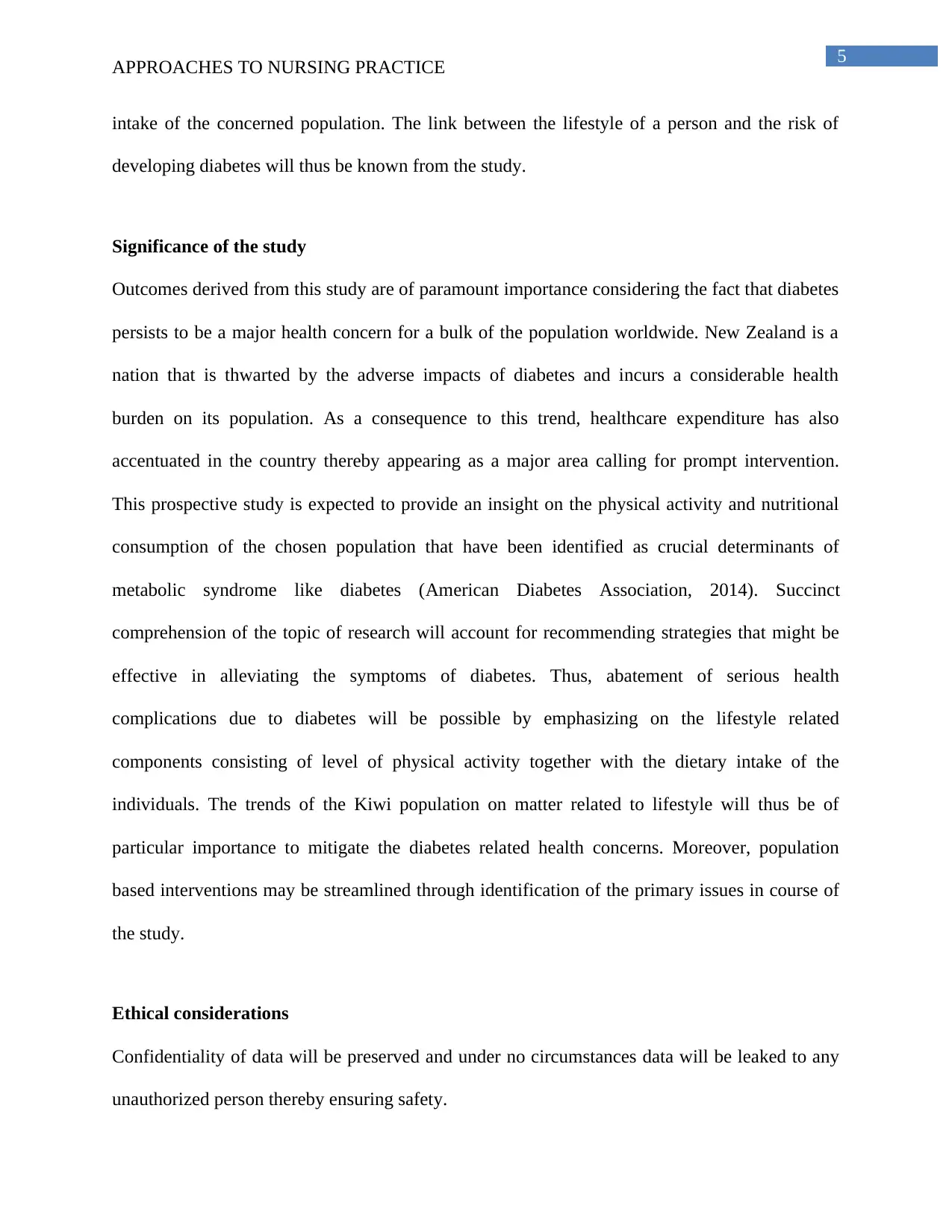
5
APPROACHES TO NURSING PRACTICE
intake of the concerned population. The link between the lifestyle of a person and the risk of
developing diabetes will thus be known from the study.
Significance of the study
Outcomes derived from this study are of paramount importance considering the fact that diabetes
persists to be a major health concern for a bulk of the population worldwide. New Zealand is a
nation that is thwarted by the adverse impacts of diabetes and incurs a considerable health
burden on its population. As a consequence to this trend, healthcare expenditure has also
accentuated in the country thereby appearing as a major area calling for prompt intervention.
This prospective study is expected to provide an insight on the physical activity and nutritional
consumption of the chosen population that have been identified as crucial determinants of
metabolic syndrome like diabetes (American Diabetes Association, 2014). Succinct
comprehension of the topic of research will account for recommending strategies that might be
effective in alleviating the symptoms of diabetes. Thus, abatement of serious health
complications due to diabetes will be possible by emphasizing on the lifestyle related
components consisting of level of physical activity together with the dietary intake of the
individuals. The trends of the Kiwi population on matter related to lifestyle will thus be of
particular importance to mitigate the diabetes related health concerns. Moreover, population
based interventions may be streamlined through identification of the primary issues in course of
the study.
Ethical considerations
Confidentiality of data will be preserved and under no circumstances data will be leaked to any
unauthorized person thereby ensuring safety.
APPROACHES TO NURSING PRACTICE
intake of the concerned population. The link between the lifestyle of a person and the risk of
developing diabetes will thus be known from the study.
Significance of the study
Outcomes derived from this study are of paramount importance considering the fact that diabetes
persists to be a major health concern for a bulk of the population worldwide. New Zealand is a
nation that is thwarted by the adverse impacts of diabetes and incurs a considerable health
burden on its population. As a consequence to this trend, healthcare expenditure has also
accentuated in the country thereby appearing as a major area calling for prompt intervention.
This prospective study is expected to provide an insight on the physical activity and nutritional
consumption of the chosen population that have been identified as crucial determinants of
metabolic syndrome like diabetes (American Diabetes Association, 2014). Succinct
comprehension of the topic of research will account for recommending strategies that might be
effective in alleviating the symptoms of diabetes. Thus, abatement of serious health
complications due to diabetes will be possible by emphasizing on the lifestyle related
components consisting of level of physical activity together with the dietary intake of the
individuals. The trends of the Kiwi population on matter related to lifestyle will thus be of
particular importance to mitigate the diabetes related health concerns. Moreover, population
based interventions may be streamlined through identification of the primary issues in course of
the study.
Ethical considerations
Confidentiality of data will be preserved and under no circumstances data will be leaked to any
unauthorized person thereby ensuring safety.
⊘ This is a preview!⊘
Do you want full access?
Subscribe today to unlock all pages.

Trusted by 1+ million students worldwide
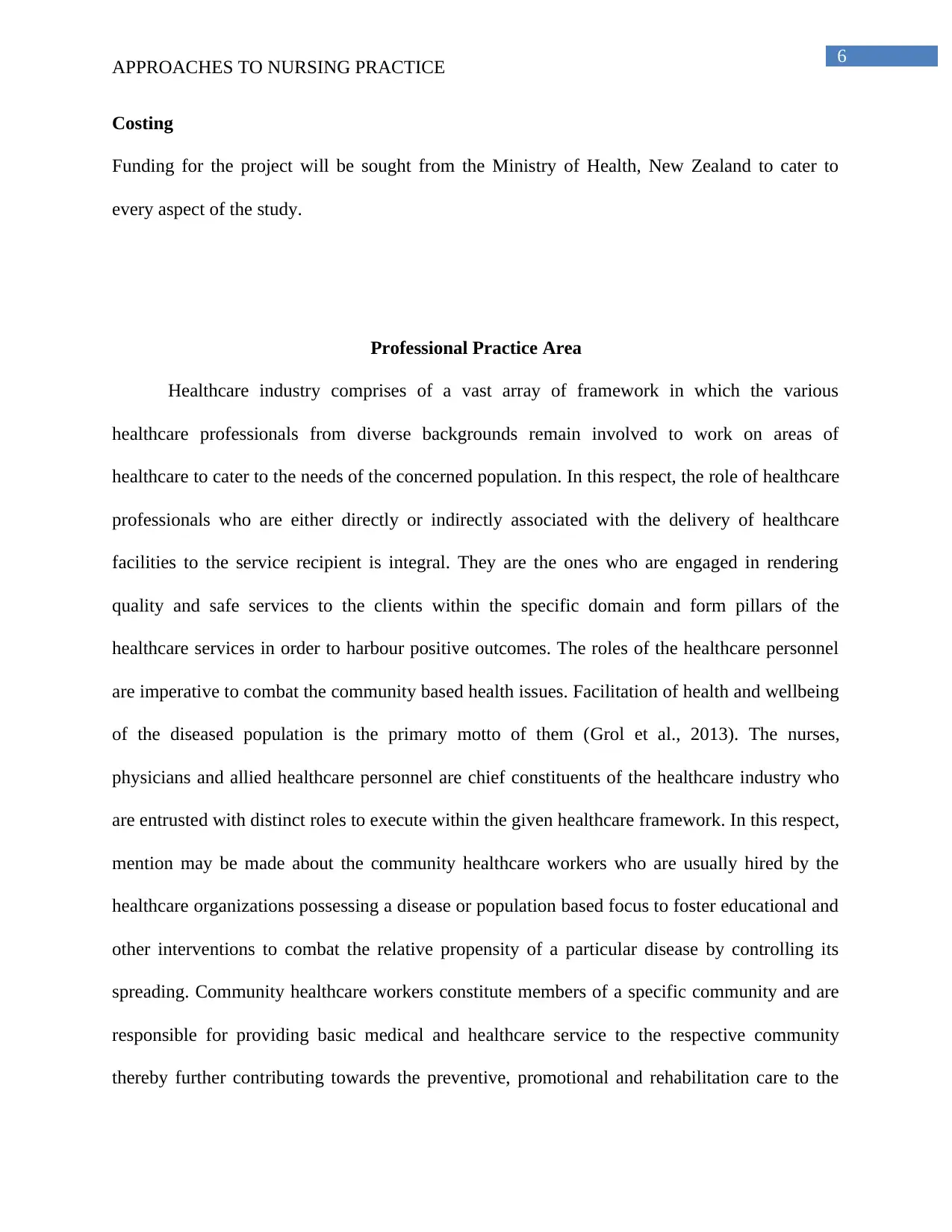
6
APPROACHES TO NURSING PRACTICE
Costing
Funding for the project will be sought from the Ministry of Health, New Zealand to cater to
every aspect of the study.
Professional Practice Area
Healthcare industry comprises of a vast array of framework in which the various
healthcare professionals from diverse backgrounds remain involved to work on areas of
healthcare to cater to the needs of the concerned population. In this respect, the role of healthcare
professionals who are either directly or indirectly associated with the delivery of healthcare
facilities to the service recipient is integral. They are the ones who are engaged in rendering
quality and safe services to the clients within the specific domain and form pillars of the
healthcare services in order to harbour positive outcomes. The roles of the healthcare personnel
are imperative to combat the community based health issues. Facilitation of health and wellbeing
of the diseased population is the primary motto of them (Grol et al., 2013). The nurses,
physicians and allied healthcare personnel are chief constituents of the healthcare industry who
are entrusted with distinct roles to execute within the given healthcare framework. In this respect,
mention may be made about the community healthcare workers who are usually hired by the
healthcare organizations possessing a disease or population based focus to foster educational and
other interventions to combat the relative propensity of a particular disease by controlling its
spreading. Community healthcare workers constitute members of a specific community and are
responsible for providing basic medical and healthcare service to the respective community
thereby further contributing towards the preventive, promotional and rehabilitation care to the
APPROACHES TO NURSING PRACTICE
Costing
Funding for the project will be sought from the Ministry of Health, New Zealand to cater to
every aspect of the study.
Professional Practice Area
Healthcare industry comprises of a vast array of framework in which the various
healthcare professionals from diverse backgrounds remain involved to work on areas of
healthcare to cater to the needs of the concerned population. In this respect, the role of healthcare
professionals who are either directly or indirectly associated with the delivery of healthcare
facilities to the service recipient is integral. They are the ones who are engaged in rendering
quality and safe services to the clients within the specific domain and form pillars of the
healthcare services in order to harbour positive outcomes. The roles of the healthcare personnel
are imperative to combat the community based health issues. Facilitation of health and wellbeing
of the diseased population is the primary motto of them (Grol et al., 2013). The nurses,
physicians and allied healthcare personnel are chief constituents of the healthcare industry who
are entrusted with distinct roles to execute within the given healthcare framework. In this respect,
mention may be made about the community healthcare workers who are usually hired by the
healthcare organizations possessing a disease or population based focus to foster educational and
other interventions to combat the relative propensity of a particular disease by controlling its
spreading. Community healthcare workers constitute members of a specific community and are
responsible for providing basic medical and healthcare service to the respective community
thereby further contributing towards the preventive, promotional and rehabilitation care to the
Paraphrase This Document
Need a fresh take? Get an instant paraphrase of this document with our AI Paraphraser
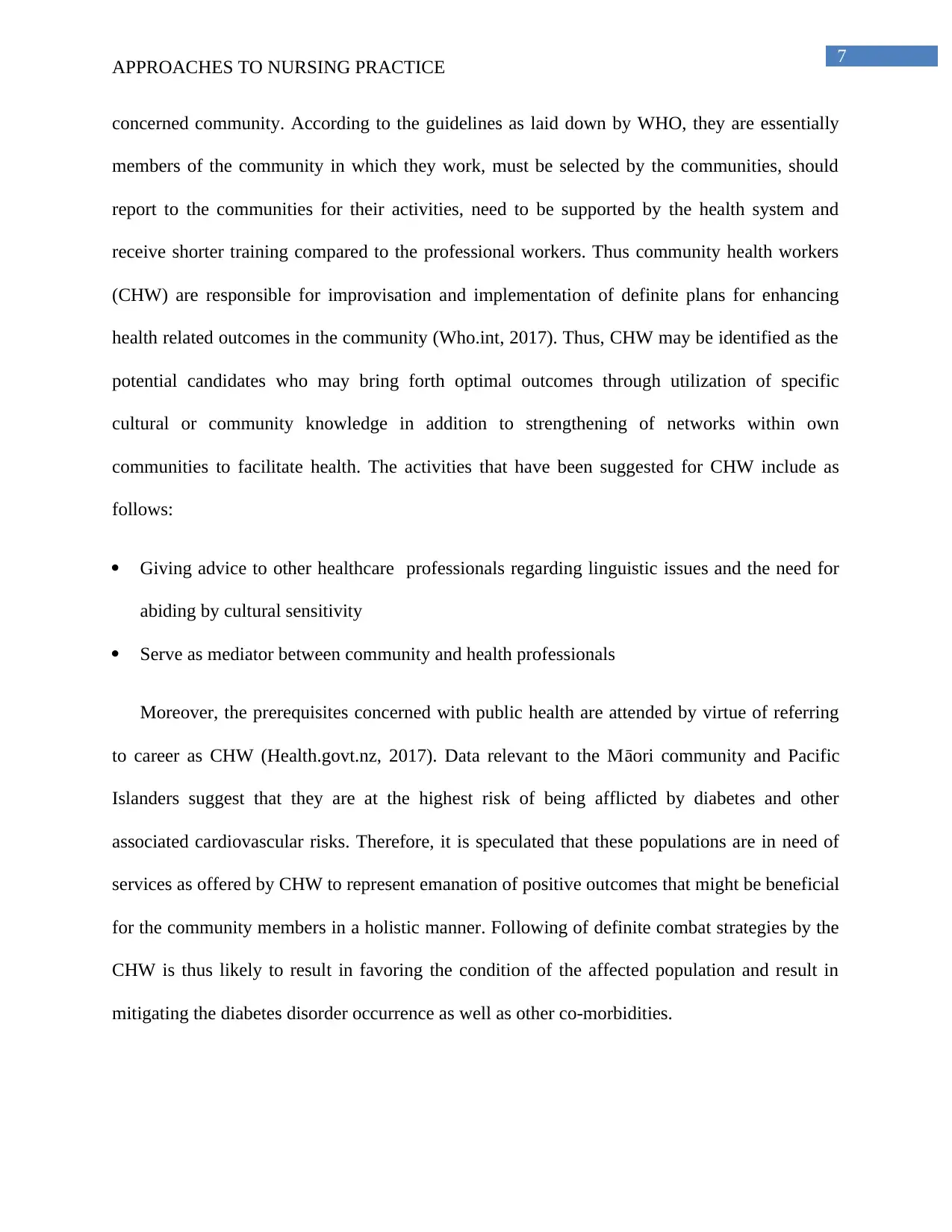
7
APPROACHES TO NURSING PRACTICE
concerned community. According to the guidelines as laid down by WHO, they are essentially
members of the community in which they work, must be selected by the communities, should
report to the communities for their activities, need to be supported by the health system and
receive shorter training compared to the professional workers. Thus community health workers
(CHW) are responsible for improvisation and implementation of definite plans for enhancing
health related outcomes in the community (Who.int, 2017). Thus, CHW may be identified as the
potential candidates who may bring forth optimal outcomes through utilization of specific
cultural or community knowledge in addition to strengthening of networks within own
communities to facilitate health. The activities that have been suggested for CHW include as
follows:
Giving advice to other healthcare professionals regarding linguistic issues and the need for
abiding by cultural sensitivity
Serve as mediator between community and health professionals
Moreover, the prerequisites concerned with public health are attended by virtue of referring
to career as CHW (Health.govt.nz, 2017). Data relevant to the Māori community and Pacific
Islanders suggest that they are at the highest risk of being afflicted by diabetes and other
associated cardiovascular risks. Therefore, it is speculated that these populations are in need of
services as offered by CHW to represent emanation of positive outcomes that might be beneficial
for the community members in a holistic manner. Following of definite combat strategies by the
CHW is thus likely to result in favoring the condition of the affected population and result in
mitigating the diabetes disorder occurrence as well as other co-morbidities.
APPROACHES TO NURSING PRACTICE
concerned community. According to the guidelines as laid down by WHO, they are essentially
members of the community in which they work, must be selected by the communities, should
report to the communities for their activities, need to be supported by the health system and
receive shorter training compared to the professional workers. Thus community health workers
(CHW) are responsible for improvisation and implementation of definite plans for enhancing
health related outcomes in the community (Who.int, 2017). Thus, CHW may be identified as the
potential candidates who may bring forth optimal outcomes through utilization of specific
cultural or community knowledge in addition to strengthening of networks within own
communities to facilitate health. The activities that have been suggested for CHW include as
follows:
Giving advice to other healthcare professionals regarding linguistic issues and the need for
abiding by cultural sensitivity
Serve as mediator between community and health professionals
Moreover, the prerequisites concerned with public health are attended by virtue of referring
to career as CHW (Health.govt.nz, 2017). Data relevant to the Māori community and Pacific
Islanders suggest that they are at the highest risk of being afflicted by diabetes and other
associated cardiovascular risks. Therefore, it is speculated that these populations are in need of
services as offered by CHW to represent emanation of positive outcomes that might be beneficial
for the community members in a holistic manner. Following of definite combat strategies by the
CHW is thus likely to result in favoring the condition of the affected population and result in
mitigating the diabetes disorder occurrence as well as other co-morbidities.
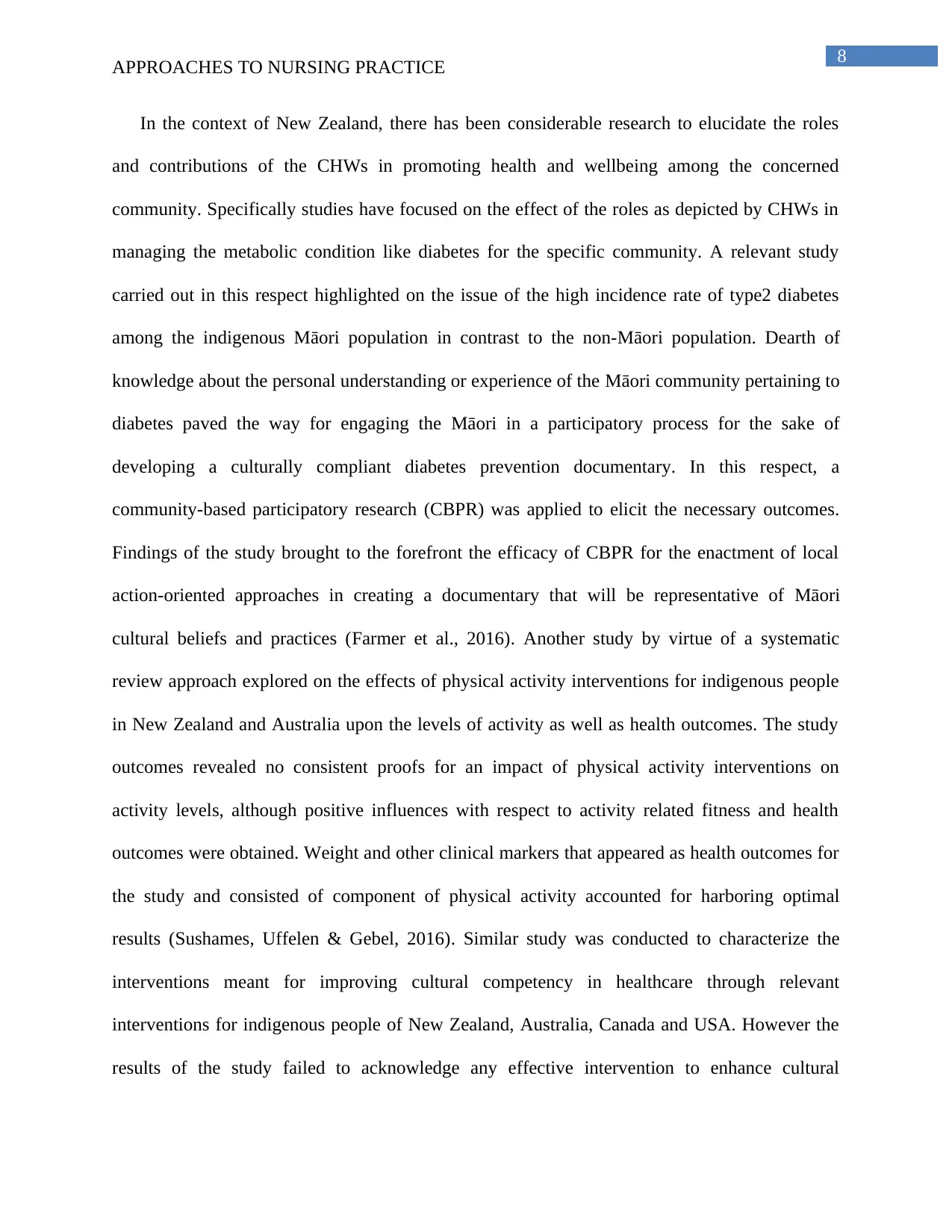
8
APPROACHES TO NURSING PRACTICE
In the context of New Zealand, there has been considerable research to elucidate the roles
and contributions of the CHWs in promoting health and wellbeing among the concerned
community. Specifically studies have focused on the effect of the roles as depicted by CHWs in
managing the metabolic condition like diabetes for the specific community. A relevant study
carried out in this respect highlighted on the issue of the high incidence rate of type2 diabetes
among the indigenous Māori population in contrast to the non-Māori population. Dearth of
knowledge about the personal understanding or experience of the Māori community pertaining to
diabetes paved the way for engaging the Māori in a participatory process for the sake of
developing a culturally compliant diabetes prevention documentary. In this respect, a
community-based participatory research (CBPR) was applied to elicit the necessary outcomes.
Findings of the study brought to the forefront the efficacy of CBPR for the enactment of local
action-oriented approaches in creating a documentary that will be representative of Māori
cultural beliefs and practices (Farmer et al., 2016). Another study by virtue of a systematic
review approach explored on the effects of physical activity interventions for indigenous people
in New Zealand and Australia upon the levels of activity as well as health outcomes. The study
outcomes revealed no consistent proofs for an impact of physical activity interventions on
activity levels, although positive influences with respect to activity related fitness and health
outcomes were obtained. Weight and other clinical markers that appeared as health outcomes for
the study and consisted of component of physical activity accounted for harboring optimal
results (Sushames, Uffelen & Gebel, 2016). Similar study was conducted to characterize the
interventions meant for improving cultural competency in healthcare through relevant
interventions for indigenous people of New Zealand, Australia, Canada and USA. However the
results of the study failed to acknowledge any effective intervention to enhance cultural
APPROACHES TO NURSING PRACTICE
In the context of New Zealand, there has been considerable research to elucidate the roles
and contributions of the CHWs in promoting health and wellbeing among the concerned
community. Specifically studies have focused on the effect of the roles as depicted by CHWs in
managing the metabolic condition like diabetes for the specific community. A relevant study
carried out in this respect highlighted on the issue of the high incidence rate of type2 diabetes
among the indigenous Māori population in contrast to the non-Māori population. Dearth of
knowledge about the personal understanding or experience of the Māori community pertaining to
diabetes paved the way for engaging the Māori in a participatory process for the sake of
developing a culturally compliant diabetes prevention documentary. In this respect, a
community-based participatory research (CBPR) was applied to elicit the necessary outcomes.
Findings of the study brought to the forefront the efficacy of CBPR for the enactment of local
action-oriented approaches in creating a documentary that will be representative of Māori
cultural beliefs and practices (Farmer et al., 2016). Another study by virtue of a systematic
review approach explored on the effects of physical activity interventions for indigenous people
in New Zealand and Australia upon the levels of activity as well as health outcomes. The study
outcomes revealed no consistent proofs for an impact of physical activity interventions on
activity levels, although positive influences with respect to activity related fitness and health
outcomes were obtained. Weight and other clinical markers that appeared as health outcomes for
the study and consisted of component of physical activity accounted for harboring optimal
results (Sushames, Uffelen & Gebel, 2016). Similar study was conducted to characterize the
interventions meant for improving cultural competency in healthcare through relevant
interventions for indigenous people of New Zealand, Australia, Canada and USA. However the
results of the study failed to acknowledge any effective intervention to enhance cultural
⊘ This is a preview!⊘
Do you want full access?
Subscribe today to unlock all pages.

Trusted by 1+ million students worldwide

9
APPROACHES TO NURSING PRACTICE
competency in healthcare for indigenous people (Clifford et al., 2015). Statistics as retrieved
from the government data suggest that Pacific people are more inclined to be affected by more
severe forms of diabetes and other cardiovascular disorders in comparison to the overall
population in New Zealand. Hence, in order to combat the ill effects of such adverse condition,
community based interventions have been strategized for effectively handling the situation in
alliance with the available resources (Stats.govt.nz, 2017). Therefore, under such circumstances,
the roles of the CHWs may be felt even more vigorously who are capable of driving positive
results that culminate in positive health effects for the community. Cultivation of culturally
competent practices by CHWs may derive holistic developmental benefits in the population that
may be easily adopted by the community members thereby accounting for improving the quality
of life in the concerned persons.
APPROACHES TO NURSING PRACTICE
competency in healthcare for indigenous people (Clifford et al., 2015). Statistics as retrieved
from the government data suggest that Pacific people are more inclined to be affected by more
severe forms of diabetes and other cardiovascular disorders in comparison to the overall
population in New Zealand. Hence, in order to combat the ill effects of such adverse condition,
community based interventions have been strategized for effectively handling the situation in
alliance with the available resources (Stats.govt.nz, 2017). Therefore, under such circumstances,
the roles of the CHWs may be felt even more vigorously who are capable of driving positive
results that culminate in positive health effects for the community. Cultivation of culturally
competent practices by CHWs may derive holistic developmental benefits in the population that
may be easily adopted by the community members thereby accounting for improving the quality
of life in the concerned persons.
Paraphrase This Document
Need a fresh take? Get an instant paraphrase of this document with our AI Paraphraser
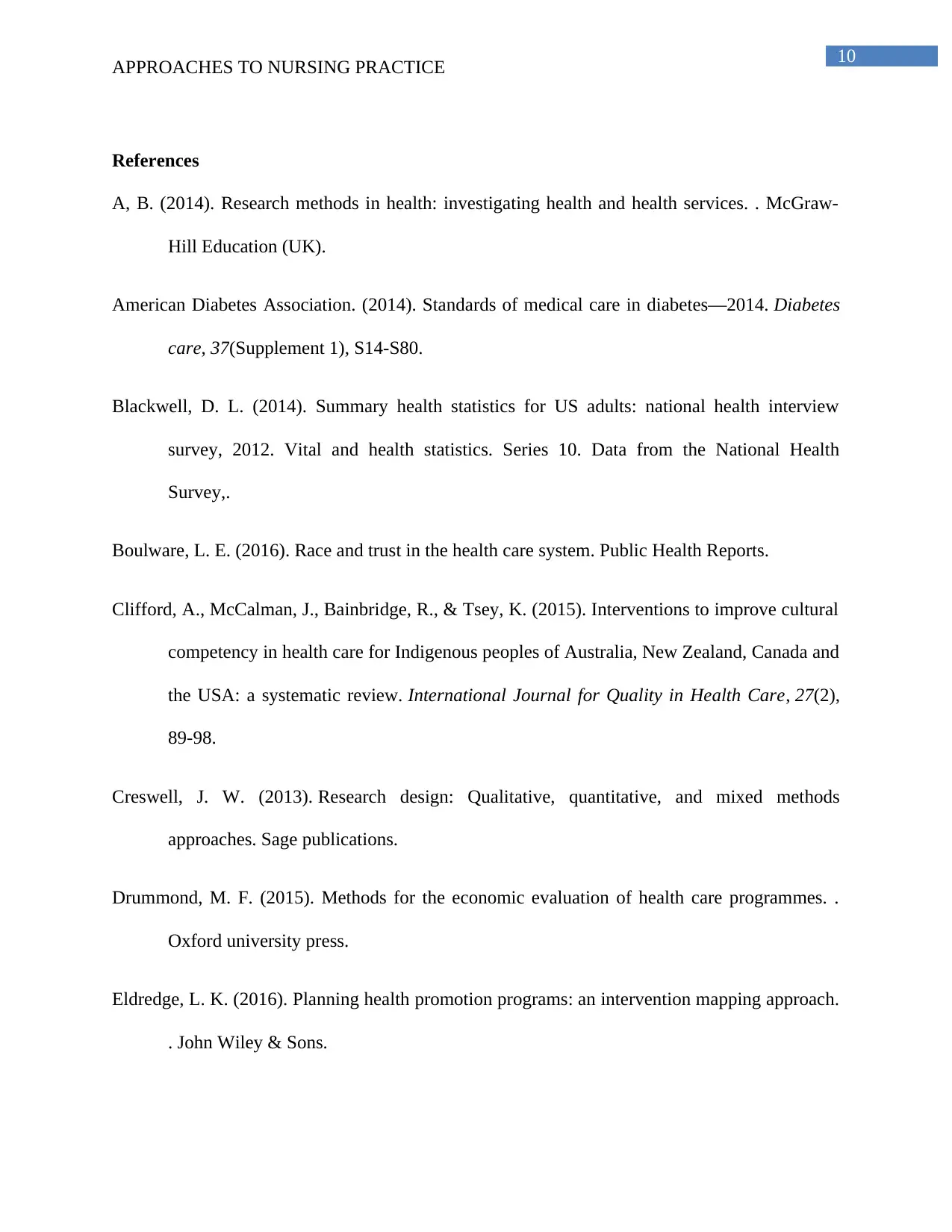
10
APPROACHES TO NURSING PRACTICE
References
A, B. (2014). Research methods in health: investigating health and health services. . McGraw-
Hill Education (UK).
American Diabetes Association. (2014). Standards of medical care in diabetes—2014. Diabetes
care, 37(Supplement 1), S14-S80.
Blackwell, D. L. (2014). Summary health statistics for US adults: national health interview
survey, 2012. Vital and health statistics. Series 10. Data from the National Health
Survey,.
Boulware, L. E. (2016). Race and trust in the health care system. Public Health Reports.
Clifford, A., McCalman, J., Bainbridge, R., & Tsey, K. (2015). Interventions to improve cultural
competency in health care for Indigenous peoples of Australia, New Zealand, Canada and
the USA: a systematic review. International Journal for Quality in Health Care, 27(2),
89-98.
Creswell, J. W. (2013). Research design: Qualitative, quantitative, and mixed methods
approaches. Sage publications.
Drummond, M. F. (2015). Methods for the economic evaluation of health care programmes. .
Oxford university press.
Eldredge, L. K. (2016). Planning health promotion programs: an intervention mapping approach.
. John Wiley & Sons.
APPROACHES TO NURSING PRACTICE
References
A, B. (2014). Research methods in health: investigating health and health services. . McGraw-
Hill Education (UK).
American Diabetes Association. (2014). Standards of medical care in diabetes—2014. Diabetes
care, 37(Supplement 1), S14-S80.
Blackwell, D. L. (2014). Summary health statistics for US adults: national health interview
survey, 2012. Vital and health statistics. Series 10. Data from the National Health
Survey,.
Boulware, L. E. (2016). Race and trust in the health care system. Public Health Reports.
Clifford, A., McCalman, J., Bainbridge, R., & Tsey, K. (2015). Interventions to improve cultural
competency in health care for Indigenous peoples of Australia, New Zealand, Canada and
the USA: a systematic review. International Journal for Quality in Health Care, 27(2),
89-98.
Creswell, J. W. (2013). Research design: Qualitative, quantitative, and mixed methods
approaches. Sage publications.
Drummond, M. F. (2015). Methods for the economic evaluation of health care programmes. .
Oxford university press.
Eldredge, L. K. (2016). Planning health promotion programs: an intervention mapping approach.
. John Wiley & Sons.
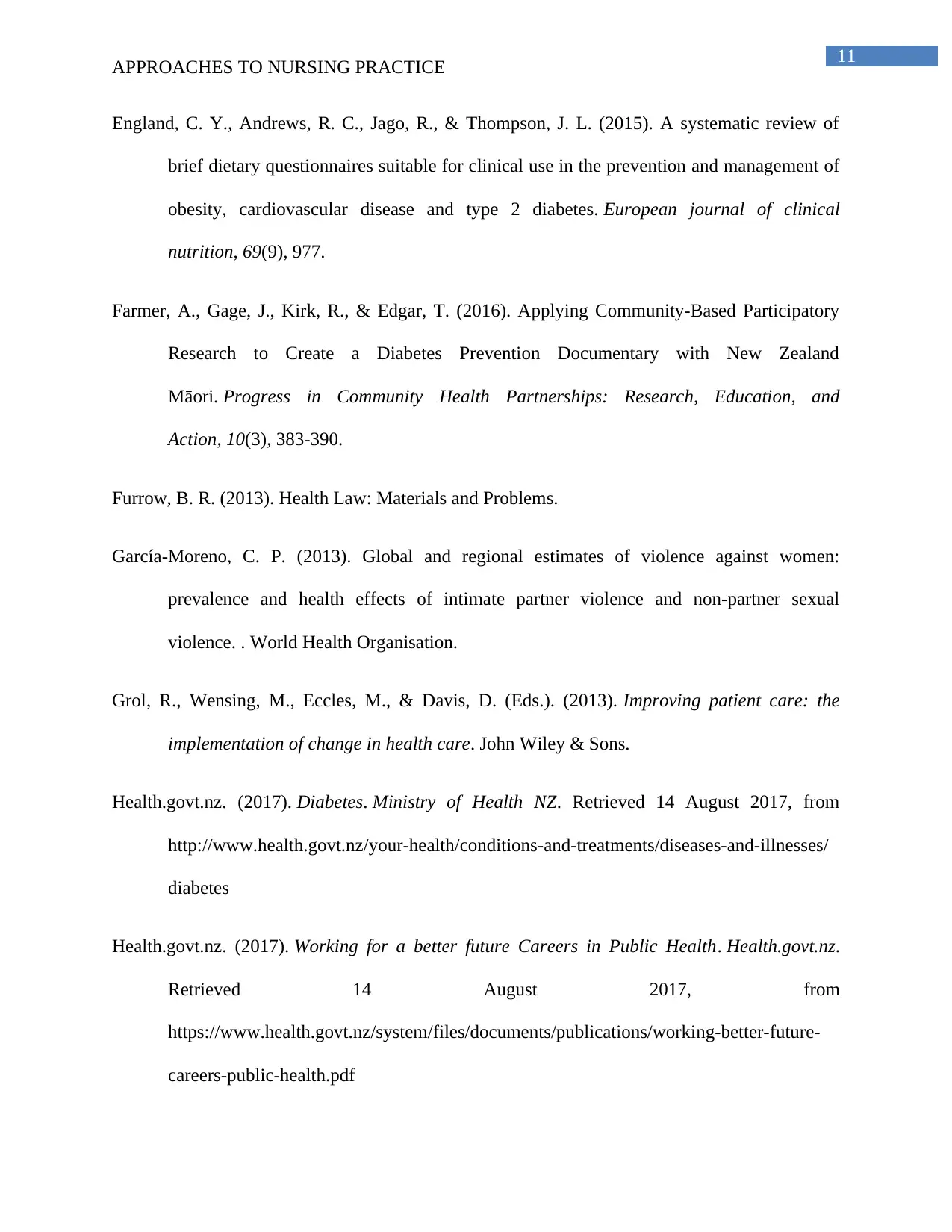
11
APPROACHES TO NURSING PRACTICE
England, C. Y., Andrews, R. C., Jago, R., & Thompson, J. L. (2015). A systematic review of
brief dietary questionnaires suitable for clinical use in the prevention and management of
obesity, cardiovascular disease and type 2 diabetes. European journal of clinical
nutrition, 69(9), 977.
Farmer, A., Gage, J., Kirk, R., & Edgar, T. (2016). Applying Community-Based Participatory
Research to Create a Diabetes Prevention Documentary with New Zealand
Māori. Progress in Community Health Partnerships: Research, Education, and
Action, 10(3), 383-390.
Furrow, B. R. (2013). Health Law: Materials and Problems.
García-Moreno, C. P. (2013). Global and regional estimates of violence against women:
prevalence and health effects of intimate partner violence and non-partner sexual
violence. . World Health Organisation.
Grol, R., Wensing, M., Eccles, M., & Davis, D. (Eds.). (2013). Improving patient care: the
implementation of change in health care. John Wiley & Sons.
Health.govt.nz. (2017). Diabetes. Ministry of Health NZ. Retrieved 14 August 2017, from
http://www.health.govt.nz/your-health/conditions-and-treatments/diseases-and-illnesses/
diabetes
Health.govt.nz. (2017). Working for a better future Careers in Public Health. Health.govt.nz.
Retrieved 14 August 2017, from
https://www.health.govt.nz/system/files/documents/publications/working-better-future-
careers-public-health.pdf
APPROACHES TO NURSING PRACTICE
England, C. Y., Andrews, R. C., Jago, R., & Thompson, J. L. (2015). A systematic review of
brief dietary questionnaires suitable for clinical use in the prevention and management of
obesity, cardiovascular disease and type 2 diabetes. European journal of clinical
nutrition, 69(9), 977.
Farmer, A., Gage, J., Kirk, R., & Edgar, T. (2016). Applying Community-Based Participatory
Research to Create a Diabetes Prevention Documentary with New Zealand
Māori. Progress in Community Health Partnerships: Research, Education, and
Action, 10(3), 383-390.
Furrow, B. R. (2013). Health Law: Materials and Problems.
García-Moreno, C. P. (2013). Global and regional estimates of violence against women:
prevalence and health effects of intimate partner violence and non-partner sexual
violence. . World Health Organisation.
Grol, R., Wensing, M., Eccles, M., & Davis, D. (Eds.). (2013). Improving patient care: the
implementation of change in health care. John Wiley & Sons.
Health.govt.nz. (2017). Diabetes. Ministry of Health NZ. Retrieved 14 August 2017, from
http://www.health.govt.nz/your-health/conditions-and-treatments/diseases-and-illnesses/
diabetes
Health.govt.nz. (2017). Working for a better future Careers in Public Health. Health.govt.nz.
Retrieved 14 August 2017, from
https://www.health.govt.nz/system/files/documents/publications/working-better-future-
careers-public-health.pdf
⊘ This is a preview!⊘
Do you want full access?
Subscribe today to unlock all pages.

Trusted by 1+ million students worldwide
1 out of 14
Related Documents
Your All-in-One AI-Powered Toolkit for Academic Success.
+13062052269
info@desklib.com
Available 24*7 on WhatsApp / Email
![[object Object]](/_next/static/media/star-bottom.7253800d.svg)
Unlock your academic potential
Copyright © 2020–2026 A2Z Services. All Rights Reserved. Developed and managed by ZUCOL.





